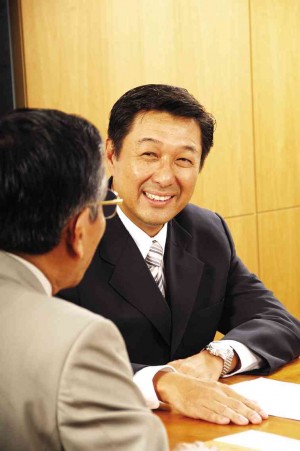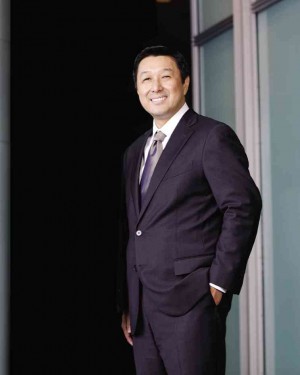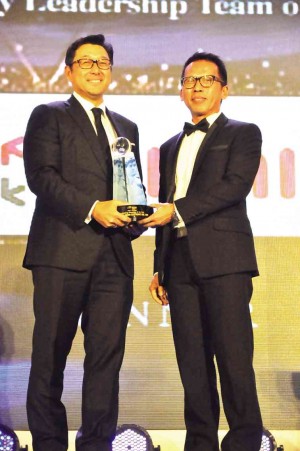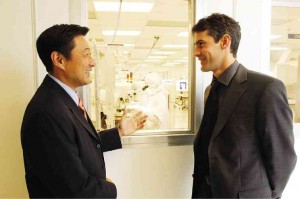CEO takes Ayala unit to global playing field
Had he been born a few decades earlier, Arthur Tan would likely be playing with the Azkals. The president and chief executive officer of Integrated Microelectronics Inc. (IMI), a unit of the Ayala Group, has an unmatched passion for soccer.
It was love of the sport that got him through college on an athletic scholarship—he played soccer to his heart’s content as he earned a degree in engineering.
These days, Tan is engaged in a much different game as head of a Philippine manufacturing company competing in the global marketplace.
Now one of the world’s leading providers of electronics manufacturing services (EMS) and power semiconductor assembly and test services, IMI has manufacturing hubs in seven countries servicing three continents—Asia, Europe and North America—powered by 15,000 full-time workers. The headcount may go up to 21,000 if contractual workers were to be included.
Article continues after this advertisement
Taking the IPO plunge
Article continues after this advertisementThe company has been expanding overseas in the last eight years as part of a strategy to operate in the backyards of clients abroad. It has acquired factories as far afield as Bulgaria.
In the first nine months of 2014, only 26 percent of IMI’s $650.1 million in consolidated revenues came from Philippine operations.
To date, the company is the 21st largest EMS provider in the world, in terms of 2013 EMS revenues. This was based on a list drawn up by Manufacturing Market Insider.
IMI serves diversified markets that include those in the automotive, industrial, medical, telecommunications infrastructure, storage device and consumer electronics industries.
The company listed by way of introduction—or without an initial public offering (IPO)—on the Philippine Stock Exchange in 2010. After four years, IMI took the plunge and sold shares to the public.
The bulk of the IPO proceeds, amounting to as much as P3 billion, will be used for capital spending and expansion. The new shares will be listed on the PSE on Dec. 5, making the global player IMI a truly public company.
Naturally hedged
Its goal over the next few years is to become a $1-billion company in terms of revenue.
Tan, 55, explains that IMI is “naturally hedged” because of its diversity in both market segments and geography.
The only time that this hedge won’t work, he says, is when the global economy implodes.
“It can happen because we’ve seen that happen with the 2008 financial crisis, but chances are very small,” he says, noting that when the global economy is rising, key markets do not surge all at the same time.
Now that its US business is improving, for instance, IMI’s operations in Mexico and the Philippines are there to take care of it. In China, where the 4G telecommunications infrastructure is being rolled out, IMI is there to ride the wave.

“We’re very positive about the future and we seem to have the right mix of European exposure, China exposure, emerging market exposure and, of course, North American exposure,” Tan says. “This allows investors to hedge their bets because our business is primarily a global business and our revenues are driven by the global economy.”
Megatrends
IMI, which was established in 1980 as a joint venture between Ayala Corp. and Resins Inc., has diversified its product line, taking into account the “megatrends” now prevailing worldwide.
For instance, Tan says, the biggest business for IMI these days comes from the automotive segment, as cars around the world increasingly require more electronics, rather than mechanical, components.
The electronics content of the average vehicle produced today continues to grow by about 15 to 20 percent, he says.
In Asia, getting a car is “aspirational,” and first-time buyers in emerging markets like Indonesia, Vietnam and China continue to grow by almost double-digit rates.
In developed markets, there’s a steady demand from consumers who wish to replace old cars with new ones.
Then there’s rising mobility, Tan says, which is indicated by rising purchases of durable goods.
“The reality is, central banks are forcing consumption to happen to fuel growth,” he says.
As energy supply continues to be an issue, even if some consumers wait for their appliances to break down before replacing them, Tan says there is a rising demand for more energy-efficient appliances.
This bodes well for IMI’s consumer and high-end industrial segments.
And with Internet usage continuing to boom, IMI has another growth trend it can capitalize on.
He describes how, in retail, companies need data metrics to understand what their consumers are buying or who are they talking to.
“That requires an infrastructure telecom backbone, and that’s where we play in,” he says.
Differentiation
Tan believes that what sets IMI apart from its peers is its knack for market customization.
“If you’re a manufacturer and you’re bidding only for the high-end, high-volume product line, it will be hard to compete when it’s a large volume but segmented products. I think this is where the size and capabilities of IMI play well,” he says.
In the case of automotive, he says that with the many car varieties available in the market, automakers really need to tap external suppliers to complete the supply chain.
“It’s not easy to be able to build 100 pieces on a line that runs a million. This is where IMI’s unique capability comes in. We have production facilities geared for the millions, but can also have production facilities geared for the hundreds,” he says.
In the past, Tan says, someone would build a product and someone else would test it, while another would package it, and a fourth would distribute it.
“What customers are looking for now is a one-stop shop. Not only should you be able to produce it, you should be able to test it, handle it logistically and distribute it in different markets,” he says.
As original equipment manufacturers look for partners who can build and develop specific product lines for specific markets, Tan says this is where IMI’s cross-border production facilities across seven countries come in handy.
“We’re engineering- and technology-focused. We’re able to handle low volume, high mix products. We’re able to produce from a basic electronic building block to a finished product in all the major regions of the world using the most advanced technology,” he says.
More in more, Tan says, IMI is becoming such a one-stop shop.
“The direction that we’re taking is, we’d like to build the whole product, test the whole product, rather than just build pieces of the product, so that the value added becomes bigger,” he says.
In the case of the cameras that IMI supplies to carmakers, for instance, only the software is built by an external partner.
In the future, he says, IMI may set up shop in new markets with a large local consumption base, such as India.
Since it can produce in “China for China,” he says, IMI may also look at producing in “India for India.”
The last frontier, he says, “is the Middle East and Africa.”
‘Hands-free’ team
Tan, who graduated with a degree in Electronics and Communications Engineering (ECE) from Mapua Institute of Technology, began his career as an engineer designing chips for US semiconductor company American Microsystems Inc. (AMI).
Tan grew up in an average middle-income household. His dad worked for the family business, a non-life insurance firm First Quezon City Insurance (now defunct), while his mother ran a small store in Greenhills.
After getting his ECE degree, he decided not to join the family business and struck out on his own.
After nearly two decades with AMI, Tan joined IMI in 2001.
As CEO of IMI, he provides people ample opportunity to take part in the decision-making process.
He is more involved in doing operational reviews, looking at trends, and watching out for red flags. He only intervenes when he feels strongly about a certain issue. He travels a lot overseas, but mostly to visit customers rather than factories, which he, however, tries to visit at least once a year.
“Because I have very good people, you will be surprised at how hands-free they are. We are a systems group company. When something goes wrong, we go back to the process. We try to figure out why the process was not able to fix it, taking the personalities out. So we make sure we always go back to the system and make it a robust system that can operate, irrespective of the personalities,” he points out.


